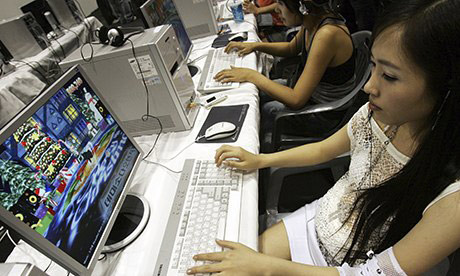
|
South Korea's parliament is considering a law that would classify online gaming as potentially antisocial addiction alongside gambling, drugs and alcohol. The bill has won support from parents, religious groups and doctors but has alarmed the internet industry and enraged gamers. The legislation includes provisions to limit advertising, while a separate bill would take 1% of the gaming industry's revenue to create a fund to curb addiction. The uproar over the legislation highlights conflicting social and economic priorities in South Korea. Internet entrepreneurs are prized as a source of innovation, but conservative politicians and many parents say online obsessions are taking a growing toll on schooling, families and workplaces. "We need to create a clean Korea free from the four addictions," Hwang Woo-yea, an MP in the ruling party, said in a recent speech. The legislative assault, backed by 14 ruling party lawmakers, is the latest phase in South Korea's culture wars. Headline-grabbing incidents such as the death by starvation of the infant daughter of two online gamers have fuelled a moral panic. A law passed in 2011 that bans gaming between midnight and dawn for anyone under age 16 is being challenged at South Korea's constitutional court. "There is a huge prejudice that gaming is harmful," said Lee Byung-chan, an attorney involved in the constitutional court case. "Games are as harmful as alcohol, drugs and gambling, that's the prejudice." Game companies have taken exception to being lumped together with drugs, alcohol and gambling, and say the bill is a death sentence for their industry. "The 100,000 people employed in the game industry are not drugmakers," said the Korea Internet and Digital Entertainment Association, which represents game companies. Online gaming has become a significant export industry. In 2012, MapleStory and other titles earned more cash from abroad for South Korea than the YouTube sensation Gangnam Style, K-pop music, movies and all other cultural exports combined. The government started studying internet game addiction in 2011. Its latest annual study found that 2% of South Koreans aged 10-19, or about 125,000 people, needed treatment for excessive online gaming or were at risk of addiction. "My parents tried to stop me but I kept playing. Even the government wouldn't have stopped me," said Shin Minchul, a 21-year-old college student as he recounted his heavy gaming past. At elementary school Shin bonded with his friends at an internet cafe playing StarCraft for three to four hours a day after classes finished. He dreamed of becoming one of the professionals with corporate sponsorship whose games are broadcast live on cable TV to audiences numbering in the millions. By high school, he was playing World of Warcraft for up to 15 hours straight. Shin's rank at school plunged from the top to bottom half. "When I tried to think more broadly about my life, playing games wasn't that important," Shin said. "Then I lost interest." Supporters of the bill say cases like Shin's show why curbs are needed. Kim Min-sun, a mother of two, said online games took children away from real life. "Without online games, kids would talk to their mother and play," she said. Others say South Korea should do more to address the factors behind online game addiction, such as hyper-competitive education and a dearth of other leisure options for teenagers. South Korea had the lowest percentage of students who reported being happy at school in 2012 among 65 countries surveyed by the Organisation for Economic Co-operation and Development. |
韩国议会拟通过一项法律,将网络游戏与赌博、吸毒和酗酒一并列入潜在反社会上瘾症。 该提案现已获得家长、宗教团体及医生的支持,但遭到了互联网产业反对并激怒了游戏玩家。这项立法案中提出限制游戏广告,而另一个提案则拟征收游戏产业1%的营业额,以建立防治游戏成瘾基金。 对该议案的反对之声凸显了韩国的社会与经济优先权之间的冲突。互联网创业素来被褒奖为创新的源泉,但保守政治家和家长们却说网络成瘾现象正在学校、家庭和工作场所中泛滥开来。 执政党议员黄伍延(Hwang Woo-yea)在最近的一次演讲中说道:"我们需要营造一个健康的社会环境,使韩国摆脱这四种上瘾行为的不良影响。" 这次立法打击网络游戏成瘾得到了14位执政党议员的支持,标志着韩国的文化之争进入了最新阶段。有两位游戏玩家醉心于游戏而饿死了自己的女婴——类似事件常常登上报纸头条,引起了社会的道德恐慌。2011年通过的一条法律禁止16岁以下的青少年在午夜到破晓这段时间内玩游戏,但该法律条文正受到来自韩国宪法法庭的挑战。 "有一种巨大的偏见认为玩游戏是有害的,"参与此案审理的律师李炳昌说道。"他们认为玩游戏和酒精、毒品和赌博的害处一样大。" 游戏公司反对将其与毒品、酒精和赌博混为一谈,认为这项立法案无疑是给游戏产业判了死刑。代表游戏公司的韩国网络电子娱乐协会抗议道:"从事游戏产业的十万员工绝不等同于制毒者。" 据悉,网络游戏已经成为韩国重要的出口产业支柱。2012年,包括MapleStory在内的网络游戏为韩国创下的外汇收入比Youtube上大热的《江南style》、韩流音乐、电影等文化出口加起来的还要多。 韩国政府自2011年起开始研究网络游戏的成瘾现象。最近的一份年度报告显示,韩国10至19岁的青少年中有2%(约为12万5千人)的人需要接受网络游戏过量治疗,或者是有游戏成瘾的危险。 21岁的大学生申敏中(Shin Minchul)在回忆自己的游戏上瘾史时说道:"我爸妈想不让我玩,但我还是在玩。就算是政府也挡不住我玩游戏。" 上小学时,申敏中每天放学后都会和朋友结伴去网吧玩上三四个小时的《星际争霸》(StarCraft)。他梦想成为一名职业游戏玩家,有自己的赞助商,每场游戏都会在有线电视上直播给千千万万的观众们看。到了高中,他可以不间断地玩《魔兽》(WarCraft)15小时。 而他在学校里的排名也从前几名直跌到倒数几名。"当我试着从更广阔的角度考虑我的生活时,玩游戏就没那么重要了,"申敏中说。"那之后我丧失了对游戏的兴趣。" 上述法案的支持者称,像申敏中这样的案例证明了立法约束的必要性。金敏允(Kim Min-sun)是两个孩子的母亲。她觉得网络游戏让孩子们远离了真实生活。"没有网络游戏的话,孩子们就会跟妈妈聊聊天做做游戏,"她如此说道。 也有人认为韩国政府应该多下点功夫来深究网络游戏成瘾背后的原因,比如说教育的竞争过于激烈、青少年娱乐途径的缺少等等。2012年,经济合作与发展组织开展的一项调查结果显示,韩国学生在校的快乐程度在受调查的65个国家中处于最低水平。 (译者 王奕Clare 编辑 丹妮) |
